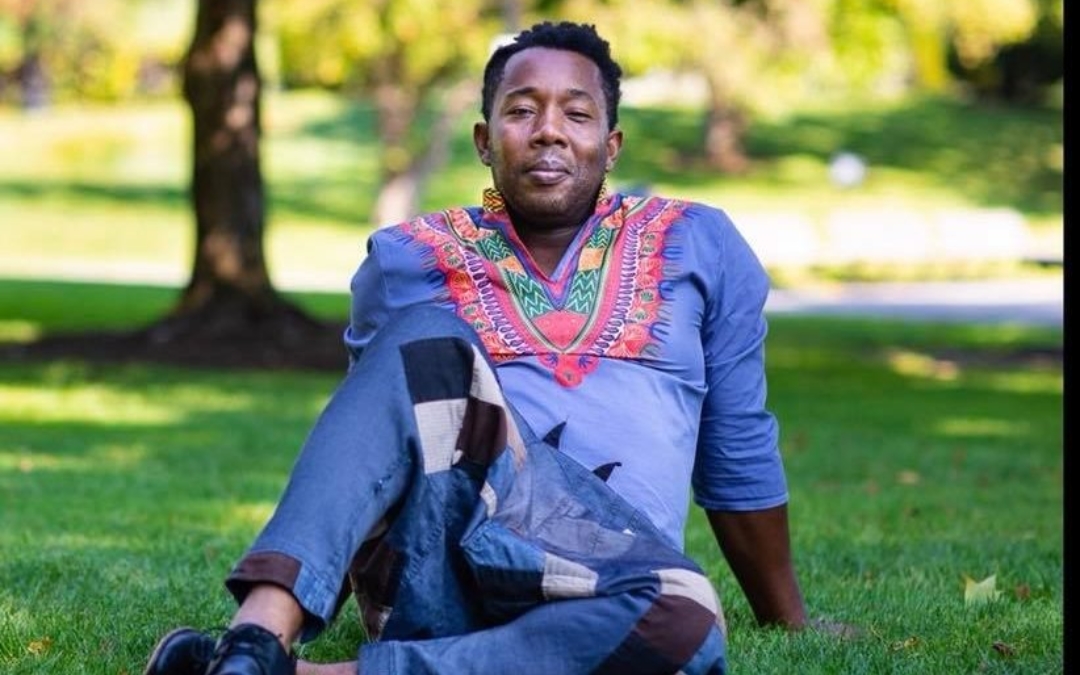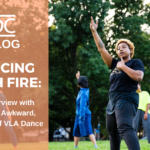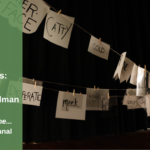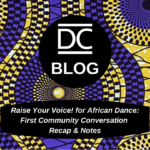Communications Intern, Annie Muise, recently interviewed Jean Appolon, Co-founder and Artistic Director of Jean Appolon Expressions, and Dance Complex Teaching Artist, about the Haitian Horton Fusion class he will be presenting at this year’s Summer Sizzle Dance Festival. The Dance Complex is thrilled to be able to feature Jean’s class at this year’s festival, and excited to share with you more about his work both here in our community, and far beyond. Jean’s Haitian Horton Fusion class will be held on August 8, 9, 15, & 16, 5:30-7PM.
Q: Can you tell us more about your workshop Haitian Horton Fusion?
Haitian Horton Fusion is a combination of Haitian Folklore and the Horton technique that I learned at Alvin Ailey many many years ago. The Horton strongly supports the Haitian Folklore, helping beginner dancers understand the bending movements and isolations which are present in the grounded Folklore style.
Q: Can you tell us more about the relationship between Horton technique and Haitian Folkloric and your interest in teaching a combination of the two?
When I was first dancing Haitian Folklore in Haiti when I was 13, most of the time I never really understood what the warm up was (the warming of the body and conditioning let by the teachers before we started dancing). They used to utilize a lot of Dunham technique warm up, which is like demi plie, grand plie, squats, lateral movements, and floor exercises. But when I first came to America with a scholarship to the Alvin Ailey School, I was exposed to a lot of Horton.
Horton technique warms the body from the head of the body, all the way to the feet. The roll up, roll down exercises that we used to do and the technique of Horton isolations, they really spoke loudly to me when I was exposed to it. It made me feel like, Wow! I can use that technique to help improve Haitian Folklore. I felt like the teachers in Haiti didn’t have enough technique for Folklore. I felt there was a great opportunity to use Horton technique as a base of conditioning to help dancers understand where the movements are coming from.
Q: Can you tell us about your summer dance program in Port-au-Prince that serves young, aspiring Haitian dancers who do not have regular access to dance training? When is it happening this summer?
I left Haiti in 1993 and when I came back in 2001, I felt like there was no more dancing there. I saw that every program that I used to go to no longer existed. So in 2006, I took the opportunity to start the dance program and we had kids coming from all over Haiti. There were kids who would walk four hours to come to the program. To us, it was an eye opener.
With the trauma that I had suffered in Haiti when my father was killed in 1991, dance was the only medium that I could use as therapy. In Haiti, there is not a culture that believes in therapy, so we don’t grow up going to a therapist to deal with trauma to find healing. Dance was the only outlet that I found could help me move forward. So when I went back to Haiti in 2006 to start that project, it was like, this program could help a lot of kids who suffered the same trauma I did, although some have suffered worse than I did.
So I started the program and kids came in numbers. We started with 15 kids, and now we have over 150 kids who come and dance with us every year. What the program really does for them is help them find a new way of finding hope, because after the earthquake, a lot of the kids don’t have parents or resources to help them. The program is the only way they feel that they are breathing again and maybe even are living again. When they finish our program, we are always given the feedback of “Mr. Jean, can you come to Haiti to stay forever!” because they would love to have a program that is year-round. We don’t have the resources in Haiti to teach every day so we tell them the only thing we can offer now is the summer program.
It’s been a rewarding experience because the kids leave there and some go and open their own studio where they teach dance in the technique we taught them, or a yoga studio, or a group for young girls or boys. I’m proud of the work we’ve done engaging young aspiring dancers because in Haiti, if you don’t have a significant amount of US dollars, you cannot go to a dance school. Haiti might have three or four professional dance studios who can really teach technique to those kids, everything else is recreational or just groups to get community going.
This year is the first year we won’t be going to Haiti because of the craziness that is happening with political unrest in Haiti, so we are going to do it here in Lawrence, MA. We’ve chosen Lawrence because one of our professional company dancers, Mcebisi Xotyeni, owns the Izizwe dance studio with his wife, located in Lawrence. There’s also a large population of Dominican and Puerto Rican people in the city and we are working to bridge these rich Caribbean cultures with Haitian dance, music and art.. We are working to build some kind of understanding between the people of Haiti and the Dominican because there has been a lot of unrest between the two. We want to create a way to dialogue, dance together, and share tradition. We feel it will be a great opportunity to engage the community and grow stronger.
Q: How can the Boston dance community support the program?
They can go to our website, or email us. I am also happy to chat over the phone, just email us for details. The dance community in Boston has been supporting me a great deal by coming to my class at The Dance Complex every Saturday, people come from all over the place. I’ve had people who have been dancing with me for the past 22 years. I have had dancers of mine who go on to Alvin Ailey or Julliard, everywhere, even Boston Conservatory. For me, this community really helped me understand why I’m doing the work that I’m doing in Haiti. The Boston community is small and we need to support each other even stronger. I feel the dance community needs to have more resources, because often people don’t have enough money to even take class. I truly appreciate the dance community here, and I hope they can stand with us so we can make our summer program even bigger for the kids in Lawrence this summer.
Q: What do you enjoy most about teaching in Boston?
I enjoy teaching everywhere, but Boston is my second home after coming from Haiti. I love teaching every type of dance- like Horton and ballet. I teach at the Boston Ballet, UMass Boston, and the Gold School. I always enjoy teaching young kids, to see them grow, become so productive, and grow into their own careers as dancers or dance teachers. It truly inspires me.
I also enjoy teaching adults who have never danced before. You can see their time in the studio completely change their life or completely change their perspective of dance. I truly appreciate when I hear those positive stories. I want to encourage all those studying hard in Boston, going to Harvard or MIT, to go and find a dance class at the Dance Complex or around Boston because community and movement helps us grow. If you’re just sitting down calculating numbers, it is easy for your mental state to become one of constant stress. Movement is the best way to find release.
Any more thoughts to share with us?
We want you to know that Jean Appolon Expressions is very accessible. We are very open to those who want to reach out. We will do whatever we can to collaborate, help improve the community, or help a group of people speak their voices louder. We are here for them.





